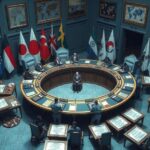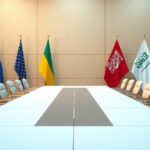Russia’s Perspective on International Talks and Conflicts: Insights from Dmitry Polyanskiy
Dmitry Polyanskiy criticized the Biden administration’s role in escalating the Ukraine conflict, praising Donald Trump’s administration for a more pragmatic approach. He highlighted Saudi Arabia’s emerging role in diplomacy, particularly concerning international talks. Additionally, he addressed Russia’s perspectives on crises in Gaza, Sudan, and Syria, reaffirming the importance of collaboration and a unified Arab approach in achieving resolutions.
In a recent interview, Dmitry Polyanskiy, the first deputy permanent representative of Russia to the UN, criticized the former Trump administration, asserting that it exacerbated the Ukraine crisis rather than addressing it. He identified the antagonistic posture of the previous U.S. administration towards Russia as a catalyst for the escalating conflict leading to the onset of Russia’s military operations in February 2022. He contended, “The Biden administration was one of those who was fueling the war,” suggesting a shift in U.S. policy under Donald Trump’s guidance, which he claims adopted a more realistic standpoint on the situation in Ukraine.
Polyanskiy discussed the recent diplomatic talks held in Saudi Arabia aimed at resolving the Ukraine conflict, citing a proposed ceasefire deal involving the Black Sea. He noted the significant role that Saudi Arabia is beginning to play in international diplomacy, stating, “The world is changing and new centers of diplomatic activity are emerging.” He lauded Saudi Arabia’s independent and proactive efforts in seeking peaceful solutions, expressing gratitude for their facilitation of negotiations among conflicting parties.
Expanding the dialogue beyond Ukraine, Polyanskiy offered insights regarding the ongoing crisis in Gaza and Russia’s consistent advocacy for a two-state solution. He acknowledged the limitations of Russian influence in pressuring Israel, particularly in comparison to the United States. He emphasized that the mobilization of Arab countries is crucial, stating, “It will depend on the mobilization of Arab countries themselves,” reiterating Russia’s steadfast commitment to a fair resolution for the Palestinian issue.
In the context of the crisis in Sudan, Polyanskiy affirmed Russia’s support for the Sudanese authorities amidst the ongoing conflict and expressed optimism regarding developments on the battlefield. He rebutted accusations concerning famine in Sudan, arguing that the issue lies in distribution rather than availability of food. He asserted that hunger should not be weaponized in international discussions, showcasing a preference for diplomatic engagement over external interference.
Lastly, Polyanskiy addressed the turmoil in Syria following the fall of Bashar Assad’s regime. He advocated for a peaceful transition in governance and highlighted the necessity of inclusive representation in Syria as focusing on combating terrorism remains paramount. While avoiding hypotheticals concerning Assad’s future, he underscored the lasting ties between Russia and Syria, emphasizing Russia’s commitment to assist during Syria’s transitional phase while nurturing their long-standing friendship.
Dmitry Polyanskiy’s remarks underscore Russia’s perspective on various international conflicts, including Ukraine, Gaza, Sudan, and Syria. His emphasis on the shifting dynamics of global diplomacy and the potential role of Saudi Arabia highlights an evolving landscape. He reiterates Russia’s commitment to longstanding international issues and expresses concern over the implications of U.S. policies in the region. Overall, Polyanskiy’s insights reflect a broader strategy that aims for stability through diplomacy and cooperative efforts among nations involved in these crises.
Original Source: www.arabnews.com








Post Comment